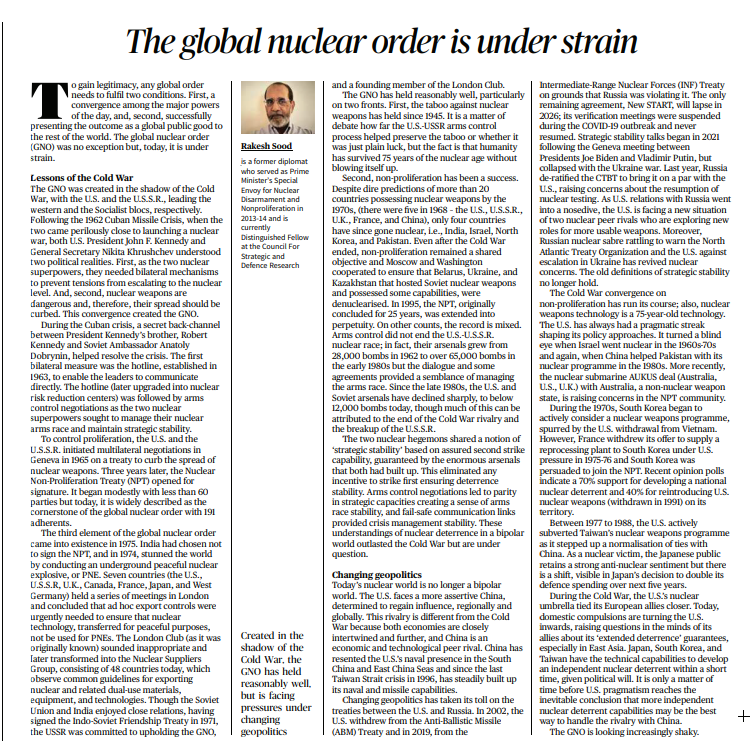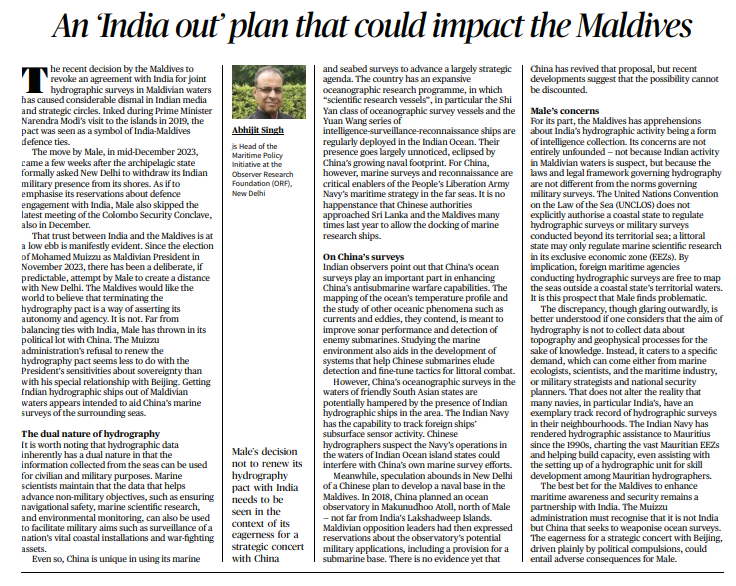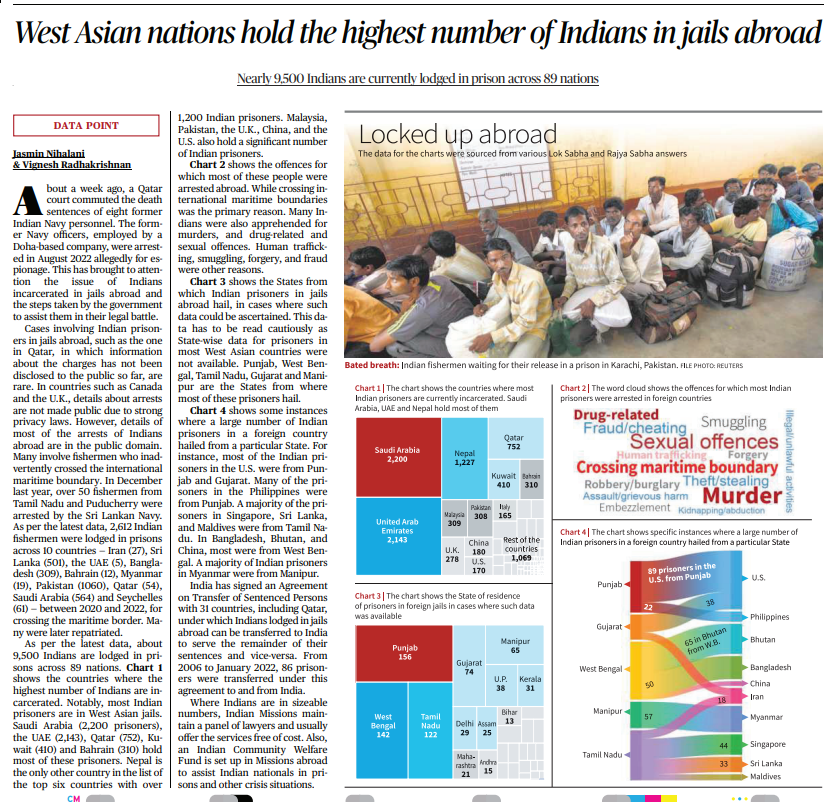Challenges to the Global Nuclear Order (GNO)
Introduction
The legitimacy of any global order hinges on achieving convergence among major powers and presenting its outcomes as a global public good.
The Global Nuclear Order (GNO), born in the aftermath of the Cold War, is facing significant challenges, raising concerns about its sustainability.
Lessons of the Cold War
- The GNO originated during the Cold War, with the U.S. and U.S.S.R. recognizing the need for bilateral mechanisms to prevent nuclear escalation.
- Initiatives such as the hotline and arms control negotiations, along with the Nuclear Non-Proliferation Treaty (NPT) and the Nuclear Suppliers Group, were instrumental in shaping the GNO.
GNO’s Successes and Challenges
- The GNO has witnessed success in maintaining a taboo against nuclear weapons since 1945 and achieving non-proliferation goals.
- However, arms control did not halt the U.S.-U.S.S.R. nuclear race, and changing geopolitics is now putting additional strain on the GNO.
Changing Geopolitics
- The bipolar nuclear world has evolved into a more complex landscape, with the U.S. facing an assertive China.
- The economic and technological rivalry between these powers, coupled with geopolitical shifts, challenges the traditional notions of strategic stability established during the Cold War.
Erosion of Treaties and Strategic Stability
- Geopolitical changes have led to the erosion of key nuclear treaties between the U.S. and Russia, including the withdrawal from the ABM Treaty and INF Treaty.
- The New START agreement is set to lapse in 2026, and strategic stability talks face challenges, raising concerns about a potential arms race.
U.S. Pragmatism and Shifting Dynamics
- The U.S., historically pragmatic in its nuclear policies, faces new challenges such as the AUKUS deal and the potential development of nuclear capabilities by its allies, including Japan, South Korea, and Taiwan.
- Domestic considerations and questions about extended deterrence guarantees further complicate the GNO’s stability.
Uncertain Future of the GNO
- The GNO, built on Cold War foundations, is increasingly shaky as geopolitical dynamics evolve.
- The erosion of treaties, shifting alliances, and the prospect of new nuclear players create uncertainty about the future viability of the GNO.
Conclusion
In conclusion, the GNO faces a critical juncture marked by the need for adaptation to contemporary geopolitical realities. The evolving dynamics among major powers and the emergence of new nuclear challenges underscore the imperative for a reassessment of global nuclear governance frameworks.
Background and Context: Maldives-India Hydrographic Agreement
The recent decision by the Maldives to revoke the hydrographic survey agreement with India, signed during Prime Minister Narendra Modi’s visit in 2019, has raised concerns in Indian media and strategic circles. This move came shortly after the Maldives requested the withdrawal of Indian military presence, highlighting a strain in bilateral relations.
Deteriorating Trust and Alignment with China
- Since the election of President Mohamed Muizzu in November 2023, there has been a noticeable effort by Male to distance itself from New Delhi.
- Despite the Maldives portraying the termination of the hydrography pact as an assertion of autonomy, it is argued that Male is aligning politically with China.
- The decision appears less about sovereignty concerns and more about supporting Beijing, possibly aiding China’s marine surveys in the region.
Dual Nature of Hydrography: Civilian and Military Implications
- Hydrographic data has a dual nature, serving both civilian and military purposes.
- While the information can be used for navigational safety and environmental monitoring, it also has military applications.
- China, in particular, employs marine surveys strategically, using scientific research vessels for intelligence purposes in the Indian Ocean.
China’s Strategic Use of Oceanographic Surveys
- China’s ocean surveys are seen as contributing to enhancing its antisubmarine warfare capabilities.
- Mapping ocean parameters improves sonar performance and helps in the development of tactics for submarine detection and combat.
- Indian observers argue that China’s activities may be hindered by the presence of Indian hydrographic ships in the region.
Maldivian Concerns and Legal Framework
The Maldives expresses concerns about India’s hydrographic activities being a form of intelligence collection. While these concerns may not be unfounded, they stem from the lack of specific regulations governing hydrographic surveys under the United Nations Convention on the Law of the Sea (UNCLOS). The Maldives finds the prospect of foreign agencies conducting hydrographic surveys beyond its territorial waters problematic.
- India’s Exemplary Track Record in Hydrographic Assistance
Despite the concerns raised, India, particularly the Indian Navy, has a commendable track record of providing hydrographic assistance to neighboring countries. The Indian Navy has supported Mauritius in hydrographic surveys, demonstrating its commitment to regional maritime awareness and security.
VII. The Need for Maldives-India Partnership
The analysis concludes that, despite the current challenges, the best option for the Maldives to enhance maritime awareness and security lies in a partnership with India. It suggests that the Maldives must recognize that it is China, not India, that seeks to weaponize ocean surveys. The strategic alignment with Beijing, driven by political compulsions, could have adverse consequences for Male.
- Introduction:
The Governor of Kerala has recently garnered negative attention due to his actions during a visit to the Calicut University campus.
This includes instructing the police to remove posters against him, labeling student activists as “criminals,” and accusing the Chief Minister of supporting them.
Additionally, he breached protocol by touring Kozhikode without prior announcement, prompting concerns about the behavior of Governors in Opposition-ruled States.
Constitutional Morality and Governor’s Conduct:
- While the Constitution primarily outlines the functions, powers, and duties of Governors, the concept of constitutional morality should guide their public conduct.
- The NCT of Delhi v. Union of India (2018) case emphasized the importance of identifying the “moral values of the Constitution.”
- The ongoing behavior of the Governor raises questions about whether his actions align with constitutional morality, especially when acting as Chancellor.
Limits to Immunity:
- Article 361 of the Constitution provides limited and conditional immunity for Governors in the exercise of their official duties. However, this does not absolve Governors of liability for misbehavior unrelated to their official duty.
- Past cases, such as Rameshwar Prasad v. Union of India (2006), have highlighted that Governors can be subject to judicial review for abuses of power, emphasizing the need to choose suitable individuals to maintain the sanctity of the post.
Public Functionaries’ Freedom of Expression:
- The Kaushal Kishor v. State of Uttar Pradesh (2023) case clarified that public functionaries, including ministers, enjoy freedom of expression but are subject to “reasonable restrictions” under Article 19(2) of the Constitution.
- Public functionaries can be held personally liable for statements inconsistent with government views, especially if unrelated to their public duty.
- This implies that extra-constitutional gestures and utterances may not be immune from legal consequences.
Commission Reports and Recommendations:
- Historical commission reports, such as the Sarkaria Commission Report (1988) and the Justice M.M. Punchhi Commission report (2010), have lamented the lack of impartiality and sagacity among some Governors.
- Recommendations include keeping Governors detached from local politics and avoiding additional powers not envisioned by the Constitution.
- The recent incident in Kerala, where the Governor acted against the Assembly’s will, underscores the need for systemic changes in the functioning of Raj Bhavans.
Future Reforms:
- Considering the recurring issues, future regimes may need to amend Article 155 of the Constitution to involve consultation with the Chief Minister in Governor appointments, as suggested by the Sarkaria report.
- Establishing an independent body with a significant role for the Chief Justice of India in selecting Governors could enhance the quality of the selection process.
Additionally, legal prohibitions against the further rehabilitation of Governors in any official capacity may be necessary to address systemic challenges in Raj Bhavans.





